NASHVILLE – The Tennessee Bureau of Investigation's 2018 ‘Crime in Tennessee’ report details the volume and nature of criminal across the state.
The report utilizes data submitted to the Tennessee Incident Based Reporting System (TIBRS). Among the findings in this year’s report:
• Overall, the number of reported instances of the most serious crimes decreased 3.6% from 2017.
• Reported cases of murder decreased 8.0% from 2017 to 2018.
• The number of reported rapes decreased 4.7% in the same time period.
• Juvenile arrestees made up 8.1% of those arrested for the most serious offenses. Simple Assault made up the most arrests among juveniles, at 25.7%, followed by Drug/Narcotic Violations, at 17.6% in 2018.
• Reported instances of offenses flagged as domestic violence decreased 6.0% from 2017 to 2018.
• The number of reported methamphetamine-related offenses continued to increase, from 13,483 in 2017 to 15,899 in 2018.
During the Fiscal Year 2017-2018, the Victim Services Coordinator had almost 500 contacts with victims and witnesses of TBI cases. There are currently 86 open cases in the Victim Services System database. The Victim Services Coordinator has contacts in all counties across Tennessee that can provide resources to victims/witnesses of active investigations. Currently, the Victim Services Coordinator has logged well over 150 hours in training and meetings in Middle, West, and East Tennessee.
A survey conducted by the Human Resources Unit determined that 84 percent of all TBI employees have some post-secondary education. The survey further indicated that 25 employees had earned an Associate’s Degree, 314 employees hold a Bachelor’s Degree (only), 97 employees hold a Master’s Degree, 11 employees hold a Doctor of Jurisprudence (J.D.) and 3 employees earned a Ph.D.
Employee Costs, 2017-2018

The Criminal Investigation Division (CID) is made up of four units: the Field Investigation Unit, the Criminal Intelligence Unit (CIU), the Medicaid Fraud Control Unit (MFCU), and the Technical Services Unit (TSU). The Field Investigation Unit is further subdivided into four geographical regions: West Tennessee, Middle Tennessee, East Tennessee and Upper East Tennessee. A Special Agent in Charge (SAC) who reports to the Assistant Director of CID heads each regional Field Investigation Unit, the Medicaid Fraud Control Unit, the Technical Services Unit and the Criminal Intelligence Unit. Each regional Field SAC is supported by two Assistant Special Agents in Charge (ASAC). The TSU, MFCU and CIU units SACs are each supported by three ASACs.
The CID was created as a resource for the District Attorneys General and law enforcement agencies across the state to provide expertise in criminal investigations. The Division is also responsible for investigating public corruption, fugitive apprehension and criminal official misconduct. The Bureau is a professional and dedicated law enforcement agency capable of responding to complex and difficult investigations. Recognizing that the image and perception of the Bureau rests on each employee, TBI emphasizes professionalism and continual training of all its employees.
As of June 30, 2018, the CID had 1,771 active cases.
The Tennessee Bureau of Investigation (TBI) has the authority to investigate any criminal violation upon the request of the District Attorney General for the judicial district where the offense occurred.
From July 1, 2017, to June 30, 2018, the Field Investigation Unit initiated 1,216 investigations, concluded 1,441 and had 708 active cases at the close of the fiscal year. During that same period, the unit conducted 391 investigative assists, obtained 119 convictions and performed 396 polygraph examinations, with the vast majority of these exams being performed at the request of local law enforcement officials.
Violent and white collar crimes make up a large percentage of cases worked by the Field Investigation Unit. District Attorneys General across the state issue written requests that a Special Agent investigates a particular crime or allegation of a crime, especially those that require an independent examination such as an officer use of force. Last year, the Field Investigation Unit opened 128 homicide cases and closed 116. Many times the homicide cases involving missing persons, are considered cold cases or are cases where human remains are found but are unidentified. Other cases worked include the embezzlement or theft of large sums of money from public entities or private business, bribery, violent sex crimes, child abuse, officer misconduct and the death of jail inmates.
The Human Trafficking section of the Criminal Intelligence Unit consists of 4 Special Agents and 3 Intelligence Analysts. The 4 agents have conducted numerous certified Peace Officer Standards Training Commission (P.O.S.T) courses of instruction with 2,687 statewide attendees. As part of the training effort, the agents worked with TBI's training division to develop and implement an online training course that satisfied the statutory and (P.O.S.T.) requirements. Since its rollout, there have been 8,955 officers from numerous agencies enrolled in the course. In fiscal year 2017-2018, the 4 agents assigned to the Human Trafficking Section opened 98 human sex trafficking cases. Of these cases, 75 involved minors under the age of 18.
The Criminal Intelligence Unit is also responsible for the administration of the TBI's Top Ten Most Wanted fugitive program. In fiscal year 2017-2018, there were 20 Top Ten fugitives apprehended. In May of 2018, TBI celebrated the 400th Top Ten capture with the apprehension of Charius Darel Ross in West Tennessee.
The Criminal Intelligence Unit contains several Intelligence Analysts trained to conduct social media exploitation and investigation. These analysts provide criminal case support, and real time intelligence updates during TBI special oper- ations, sex offender round ups, human trafficking operations, missing children investigations, fugitive investigations, and any other type of investigation upon request.
CIU is responsible for the collection and dissemination of intelligence related to threats made against law enforcement officers, law enforcement agencies, and service members/military instillations. CIU also coordinates intelligence in partnership with various federal, state, and local agencies when dignitaries visit our state.
The TBI, with the assistance of the Department of Education, established a toll free School Violence Hotline for the receipt of information relating to potential violent acts. The School Violence Hotline is answered 24 hours a day, 7 days a week.
TSU is tasked with deploying advanced technologies in support of TBI Special Agents and the Tennessee law enforcement community. In addition, a growing percentage of the total evidence available in any criminal case exists in the digital world, moving across a wide range of devices and services. TSU's mission is to ensure that TBI agents and other law enforcement officers from federal, state and local agencies can collect and understand as much of that evidence as possible.
TSU houses the TBI's response to the growing threats of online child victimization and Cyber Crimes. During fiscal year 2017, these agents processed 171 CyberTips from the National Center for Missing and Exploited Children, compared to 178 CyberTips for the fiscal year 2016. Of those leads, 138 involved the possession, manufacture, or distribution of child pornography, 5 involved minor sex trafficking, 5 involved the molestation of a minor not by a family member, 20 involved the online enticement of children for sexual acts, 2 involved unsolicited obscenity directed to a child, and 1 involved threats of violence over the internet.

TBI’s digital forensics function is housed within TSU. During Fiscal Year 2017-2018, TSU personnel analyzed 741 individual pieces of evidence from 316 cases, resulting in a 16% increase in evidence items and a 22% increase in cases over fiscal year 2016-2017. On average 30% of the cases worked by TBI will be TBI cases; the other 70% of cases are worked for other federal, state, and local agencies. Looking at the cases, 161 were mobile devices only, 53 were computer forensic examinations, and the rest ranged from technical assists and digital/audio enhancements. Traditionally, 30% are death investigations, 30% involve some form of child exploitation, 10% are drug investigations, 10% involve theft or robbery, 5% are public corruption investigations, and 5% are fraud investigations, with the remainder varying among other offenses.
During the fiscal year, 293,234.64 dosage units and 3,676.4 grams of prescription drugs were seized during investigations involving the DID, which included: 80.0 dosage units of steroids; 289,786.58 dosage units and 1,000.0 grams of alprazolam; 79 dosage units of Dilaudid; 136.06 dosage units and 153.42 grams of Fentanyl; 796.5 dosage units of hydrocodone; 91 dosage units of methadone; 1,842.34 grams of ketamine; 17 dosage units of loritab; 221 dosage units of morphine; 625.5 dosage units and 680.64 grams of other RX drugs; 1,376.0 dosage units of Oxycodone; 6.0 dosage units of OxyContin; and 20 dosage unit of valium were seized.
The Forensic Services Division is comprised of a central laboratory in Nashville and two regional laboratories in Memphis and Knoxville. Specialized units of these laboratories provide forensic analysis of biological, chemical, and physical evidence. The Forensic Biology Unit performs identification and characterization of blood and other body fluids – liquid or dried, animal or human – present in a form to suggest a relation to the offense or persons involved in a crime.
T.C.A. §40-35-321 requires the TBI to establish a DNA database for convicted offenders that now includes individuals on the sexual offender registry. In 2007, an amendment added a DNA database for individuals arrested for violent felonies. These databases were established nationally by the Federal Bureau of Investigation to enable crime laboratories to exchange DNA profiles for unknown forensic samples, convicted offender, and arrestees. The Combined DNA Index System assists agencies in developing investigative leads by enabling evidentiary DNA profiles to be searched against the database of convicted offenders and arrestees. Since 1991, the TBI has received 249,172 convicted offender samples and 161,426 arrestee samples. During this Fiscal Year, a total of 11,879 specimens from convicted offenders and 14,852 specimens from arrestees were received for submission to the CODIS database. In February 2002, TBI began submitting samples to the national CODIS database. After accounting for expunged samples, 235,063 offender profiles and 109,412 arrestee profiles have been uploaded to the national database to date. A total of 4,660 investigations have been aided throughout the state and nation since 2002 through the use of this database, including 689 this year.
Employee Costs, 2017-2018
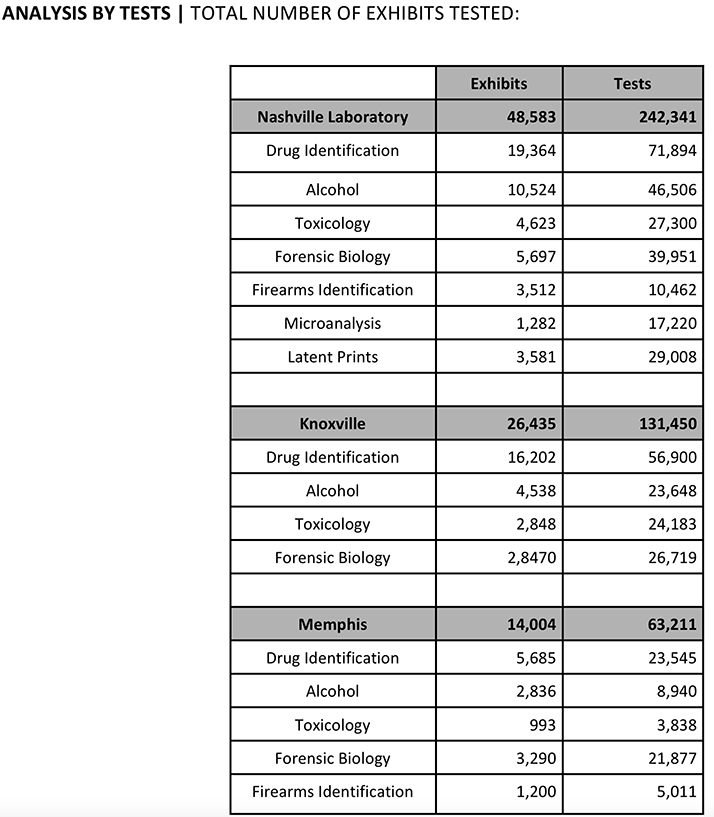
TBI is the agency identified as the state repository of fingerprint-based criminal records information for the state of Tennessee.
To meet the requirements of the Brady Handgun Violence Prevention Act, Tennessee Instant Check System (TICS) accesses the following databases:
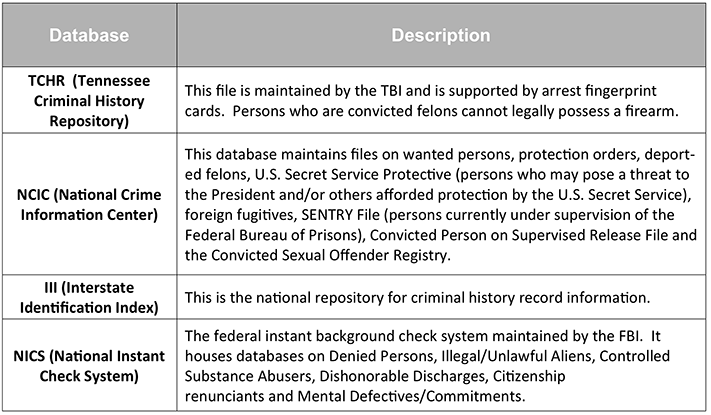
During Fiscal Year 2017-2018, TICS processed 504,267 total firearm transactions. Of those, 481,938 (95.8 percent) were approved and 21,236 (4.2 percent) were denied for one or more reasons. Ninety-four percent of all transactions were approved in fifteen minutes or less. TICS identified 425 wanted persons and 466 stolen firearms, reporting them to the appropriate law enforcement agency. The majority of the wanted persons were apprehended at the scene and all of the stolen firearms were verified by law enforcement officials and seized for return to the owners.
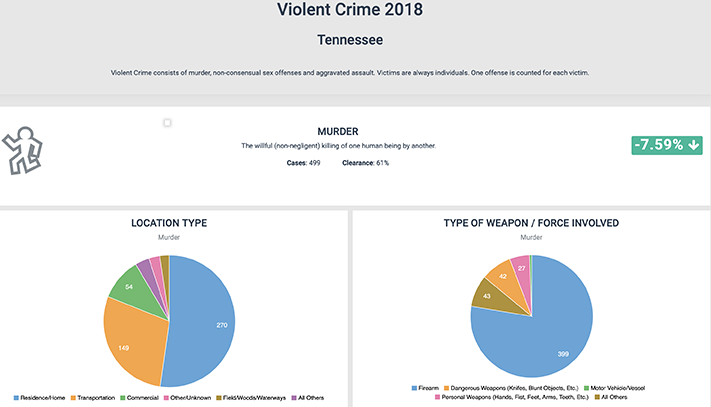
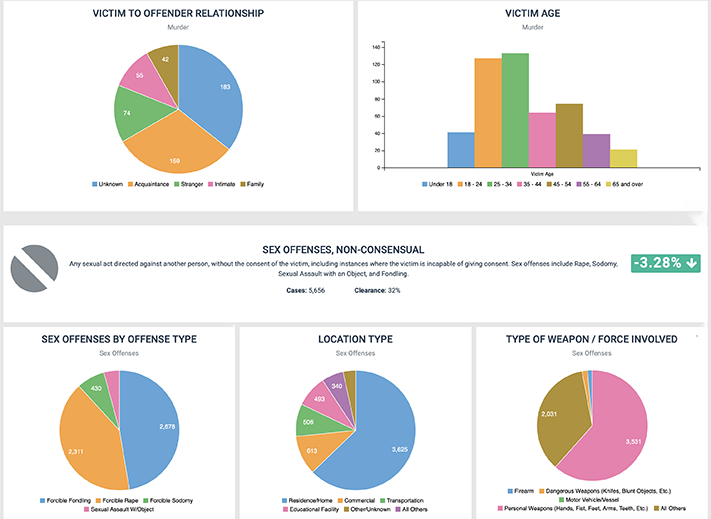
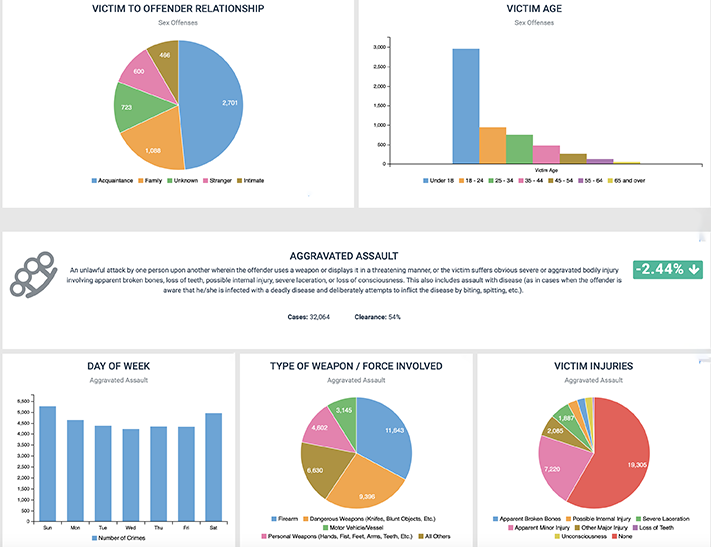

“The TIBRS program continues to serve as a model for the national and remains successful because of the continued cooperation by Tennessee’s law enforcement community,” said TBI Director David Rausch. “We hope this year’s report continues to shape the conversation about how best to make Tennessee and even better – and even safer – place to live.”
The TBI strongly discourages using the data collected in the TIBRS program to rank or compare one agency to another, as doing so does not take into consideration the context of demographics and socio-economic factors. It is more appropriate, in TBI’s assessment, to compare an agency’s crime data over time.
Source: TBI

